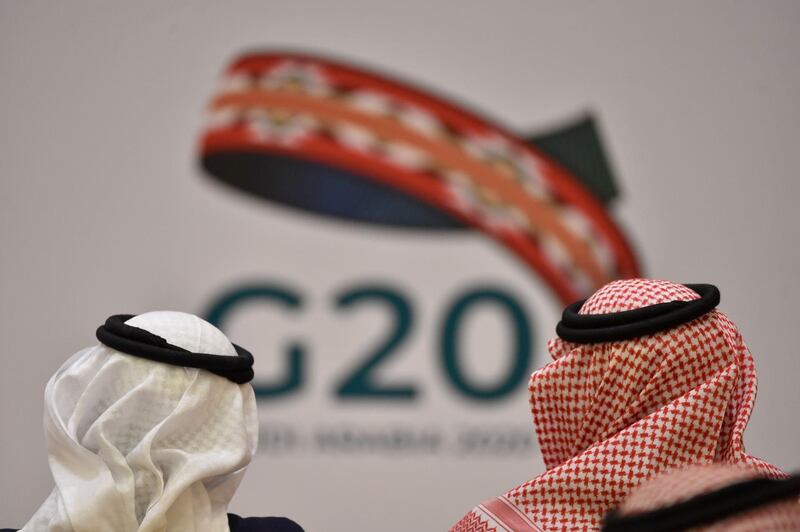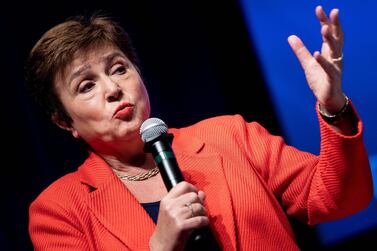Financial policymakers from the world’s 20 largest economies expect a modest uptick in the global economy this year and next, but say growth remains vulnerable to geopolitical risks, trade tensions and policy uncertainties.
The Group of 20 finance ministers and central bank governors also see the need for an enhanced global risk monitoring on the back of the recent outbreak of the deadly coronavirus.
"The recovery [from 2019] is supported by the continuation of accommodative financial conditions and some signs of easing trade tensions," the G20 said in a joint communique in Riyadh on Sunday. "However, global economic growth remains slow and downside risks to the outlook persist."
A rise in geopolitical tensions, the threat of a disorderly Brexit and trade tensions between the US and China last year pulled the global economic growth to the lowest level since the 2008 financial crisis. The phase-one trade deal between the world’s two biggest economies has cut the overhang to some extent.
The financial leaders also reaffirmed the conclusions on trade and investment that were finalised at the Osaka Summit in 2019. The group said it would continue to take joint action to strengthen international cooperation and frameworks.
"We will continue to monitor and as necessary continue to tackle financial vulnerabilities. We also reaffirm our commitment to ensure a stronger global financial safety net .... [the G20 also] reaffirm our exchange rate commitments made in March 2018," according to the communique.
The spread of the deadly Covid-19, is another risk that could hamper global growth. The epidemic has so far infected more than 76,000 people in China and claimed 2,442 lives in the country. The infection is also rapidly spreading in countries such as South Korea, Italy and Iran.
China's economy, which grew at the slowest pace in three decades last year on the back of the tariff war, is expected to slow further this year. The International Monetary Fund on Saturday lowered China’s economic growth forecast by 0.4 percentage points to 5.6 per cent and said the epidemic could shave 0.1 percentage points from global growth. The Washington-based fund, which expects a "V-Shaped impact on the Chinese economy", is leading calls for a synchronised policy response to soften the impact of the epidemic on global growth.
“We must work together to contain Covid-19 — both its human and economic impact — especially if the outbreak turns out to be more persistent and widespread,” the IMF managing director Kristalina Georgieva said in a statement on Sunday. “The IMF stands ready to help, including through our Catastrophe and Containment Relief Trust that can provide grants for debt relief to the poorest, most vulnerable countries.”
China was represented at the Riyadh G20 meeting by its ambassador to the kingdom as senior economic and finance officials continue to grapple with the spread of the virus.
Saudi Arabia's central bank governor Ahmed Al Kholifey however on Saturday told an IIF conference in Riyadh "it is too early to judge the impact" of the virus on global GDP.
“Specifically on Coronavirus, [the G20] members are deeply saddened by the loss of life and suffering. The G20 remains in close coordination with all relevant stakeholder to stand ready to take further action to address these risks,” Saudi Finance Minister Mohammed Al Jadaan said at the conclusion of the meeting.
Finance ministers and central bankers are facing the challenge of low interest rates globally. Continued expansionary monetary policy stance has left central banks limited policy headroom to manoeuver in a more serious economic slowdown. Elevated financial asset prices and their impact of financial stability have challenged the policy makers globally.
"Monetary policy should continue to support economic activity and ensure price stability, consistent with central banks’ mandates," the communique noted.
The financial leaders, who also discussed the challenges arising from digitisation of economies, endorsed a global tax overhaul proposed last year by the Organisation for Economic Cooperation and Development (OECD). The proposed regulations affect global technology giants from Alphabet’s Google to Facebook and Amazon to China’s Alibaba Group.
Taxing tech companies globally, most of whom are US firms, is opposed by Washington. The proposal to tax the companies in the country of their operation is aimed at increasing tax revenue. The OECD calls the tax "Pillar One" while the minimum effective tax rate is called the "Pillar Two". European countries in particular are enthusiastic about taxing multinational technology firms, however, the US has warned it will take retaliatory measures against the move.
"We welcome the recent progress made on addressing the tax challenges arising from the digitalisation of the economy," the G20 said in the communique.
"We endorse the Outline of the Architecture of a Unified Approach on Pillar One as the basis for negotiations and welcome the progress note on Pillar Two ....," it said. "We encourage further progress on both Pillars to overcome remaining differences and reaffirm our commitment to reach a consensus-based solution with a final report to be delivered by the end of 2020."
The leaders said the global landscape is being rapidly transformed by "economic, social, environmental, technological and demographic changes". The collective work of the group of 20 largest economies should focus on fostering "sustainable development and growth, and create the conditions in which all people can live, work and thrive".
"Therefore, we agree to develop a menu of policy options that countries can draw from to enhance access to opportunities for all," the leaders said in the communique.
Infrastructure, a key driver of growth, can be further enhanced through technology, the G20 said, adding that it agreed to develop an Infrastructure Technology (InfraTech) agenda.
"We will also continue to advance the implementation of the Roadmap to Infrastructure as an Asset Class, including a focus on the regulatory framework for private sector participation in infrastructure investment, according to the communique.
When asked about the ongoing political and financial turmoil in Lebanon and if help will be extended by the G20 or on bilateral level, Mr Al Jadaan said that Lebanon is an Arab country and “we surely care and always follow up on what’s happening there”.
The kingdom is in touch with other countries, but “we need to follow up before presenting any reforms on political level and should see with other countries [if they] would like to collaborate as well”, he added.








